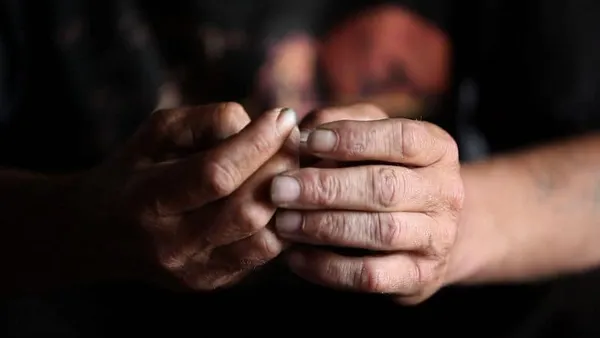Eye For Film >> Movies >> Cain's Children (2014) Film Review
Cain's Children
Reviewed by: Jennie Kermode

Sometimes a film starts with a film. Hungary left the Soviet Union in 1989 but has never fully succeeded in cleaning out its closets; there were a lot of skeletons hidden there, back in the day. Among them, a documentary made in 1984 and banned shortly afterwards - a look inside the country's prisons where guards complain that there are 25 inmates to a cell - there are only supposed to be 24. Three faces stand out: Zsolt, József and Pál, all incarcerated for crimes they committed as children. When Marcell Gerö saw them decades later, he became fascinated by their stories and determined to track them down, to find out what had happened.
Stories like these, no matter where in the world they originate, are often much the same, but it's remarkable how rarely they're told. As such - and because everybody likes to think that their country is doing better - they retain their power to shock. Gerö was unprepared for what he discovered - for a journey into homelessness and squalor, repeated imprisonment ("then I had another manslaughter..."), family breakdown and a legacy of poverty for the next generation. It's a very different side of Hungry from that with which most viewers will be familiar, revealing the shadow cities that exist around the famous urban centres and the rural poverty that's easy overlooked by citizens and visitors alike.
None of the men interviewed here can give a clear reason as to why he committed his crime. They all seem to have had problems with impulse control, common enough in young people but here persisting into adulthood - whether as a consequence of their innate nature or their experience of the prison system, it's hard to say. One of them talks about killing a man who came on to him and it's hard to tell if he was defending himself from a predatory paedophile or simply freaking out because off how he'd been conditioned o think about gay men. Another shot his father, having "jut meat o scare him." Weapons seem to ave been easy to come by. All these men cling to very traditional masculine roles; no-one ever seems to have shown them how to negotiate their way ou of conflict, for all that they show us, s the documentary proceeds, that they are capable of sympathy, generosity and love.
Gerö's footage isn't very well organised. His archive material is powerful in places but scrappy. Nevertheless, there are really interesting stories here and his unwillingness to shape them into more conventional narratives of corruption or redemption is a strength. There's a rawness about this film that is perfectly suited to its subject and which, indeed, may make it easier for people who've had similar experiences in other countries to identify with. Nobody here is asking for forgiveness; it's not clear that they fully understand they've done anything that might need to be forgiven. They are simply passing through life and have found themselves on an unexpected course.
Reviewed on: 25 Jan 2016















